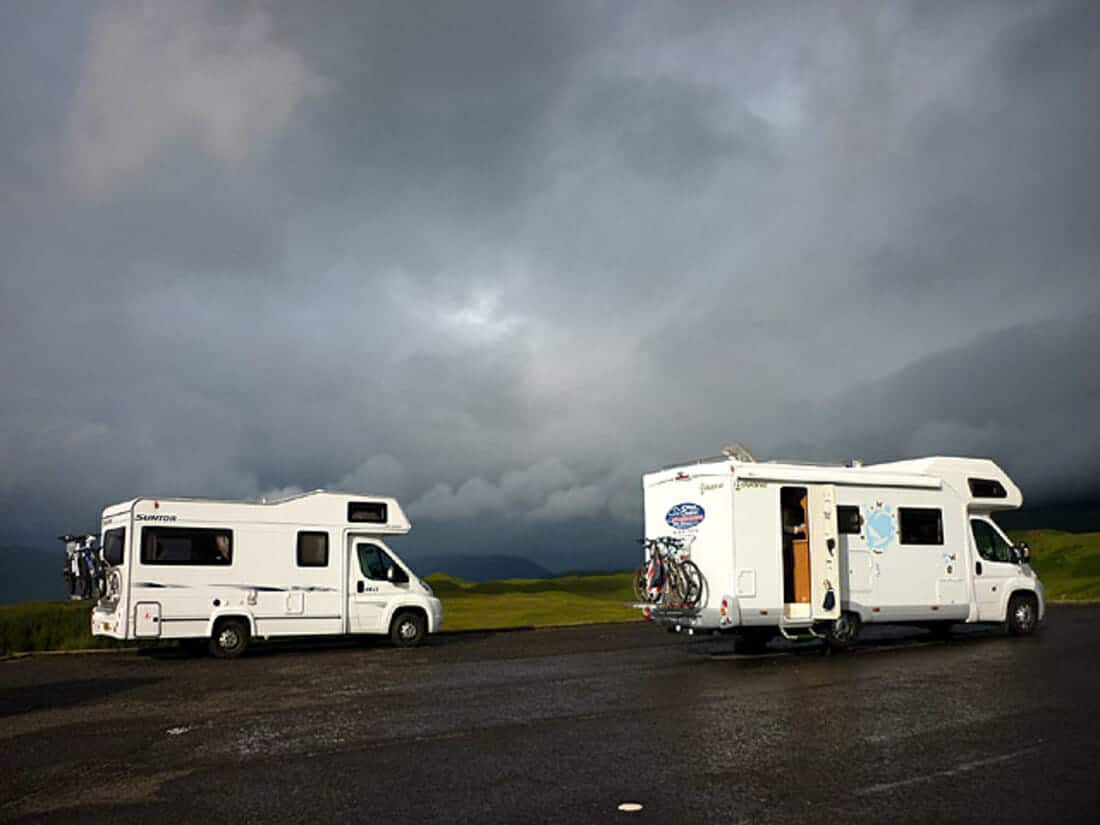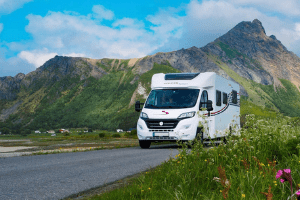Looking to get away from it all but unsure whether the outdoor life is for you? A motorhome could offer the ideal way to combine the freedom of the open road with the home comforts you’ve become accustomed to.
But if you’ve never spent an extended period of time in a motorhome, the idea of life on the road can be pretty daunting and fraught with questions. So, to put your mind at rest, we have updated our original guide to educate you on everything you need to know about living in a motorhome.
Can you live in a motorhome all year?
Before you hit the road, you first need to find out whether you and your travelling companions are cut out for life in a motorhome.
If you’re travelling as a family, you’re probably used to having your own personal space at home, but life in a motorhome means you’ll all be living right on top of each other. This means that clutter can quickly pile up but, on the plus side, a motorhome is much easier to clean than an entire house.
And while living in close quarters might be fine for a week or two at a time, things could get fraught on longer holidays or if you choose to live in your van full time – in truth, living in a motorhome full time is probably better suited to singles or couples, rather than families.
Is it legal to live in a motorhome in the UK?
Yes – there are no UK laws stopping you from living in your motorhome or campervan full-time. The only requirement is that your vehicle has a valid MOT certificate and it’s vehicle excise duty (VED, also known as road tax) is up to date so it’s fully road legal.
Can a motorhome be parked on the street?
There are some other things you’ll also have to consider, not least when and where you can legally park up for the night. Although the main appeal of living in a motorhome is that you’re not tied down to one location, there are restrictions on where you can park up and reside, meaning you can’t simply live anywhere you choose.
Most, if not all, local authorities across the UK and Europe will place restrictions on when and for how long you can park up on certain streets and laybys, including whether you can spend the night there. If you’re unsure on where you can and can’t park, particularly at night time, check the UK Highway Code guide, or an equivalent if you’re travelling to Europe.
Even if overnight parking is permitted, it might not be safe to do so, so always check out the surrounding area beforehand – if it doesn’t feel right, it might be best to move on.
How long can you live in a motorhome?
If you’re looking at using your motorhome for more than weekend getaways or short trips around the UK and Europe, you’ll fall into one of two camps:
- A full-timer – Those who choose to live in their motorhome or caravan all year round.
- A long-termer – Those who choose to live in their motorhome for an extended period of time, but return to another residence at certain times of the year.
Once you’ve decided which category you fall into, you then need to work out whether you’re cut out for living in a motorhome. If you’ve agreed that full-timing is the right lifestyle for you, you need to consider the following:
- Could you live in a motorhome all year, without the amenities and space offered by a house or flat?
- How much does it cost to live in a motorhome?
- Will you stay in one location or travel around to different places?
- Will you be able to carry on working or do you have another way to supplement your lifestyle?
- Will you sell your main residence? It’s advisable not to, as properties generally always appreciate in value and you’ll still need a ‘permanent’ residence to receive mail. You may be better off letting out your property and using this money to maintain your mortgage or as a wage if you already own it outright.
How much does it cost to live in a motorhome?
When you factor in fuel, food, maintenance costs, insurance, tolls, repairs, laundry and site fees, you can probably expect to pay anywhere between £700 and £1,500 a month to live in a motorhome full time.
Although life in a motorhome will most likely be cheaper than living in a house or flat – there are no expensive mortgage or rental costs, and the limited space means fewer possessions – the cost of living will fluctuate depending upon how much you travel around and whether you stay on campsites or live ‘wild’.
You’ll also have to factor in the cost of the motorhome itself, alongside insurance, fuel and repair costs. And because your living costs can vary greatly from week to week, depending upon site fees and how far you travel, you could find that sticking to a budget is tricky.
Can I live in a motorhome on my own land?
You can live in a motorhome on your own land, but there are a number of restrictions and licencing conditions that mean you can only do so for a limited period of time. In general, you can stay in a caravan or motorhome on your own land for 28 days without a licence or planning permission – any longer and you could be served an eviction notice.
If you want to use your land as a caravan site, you’ll need to apply for a licence. This may come with a fee and will only last as long as you have planning permission for the caravan site. You could be fined up to £2,500 if you don’t get a licence or break any of your licence conditions, and your licence may be withdrawn completely if you repeatedly break its conditions.
The council can also put conditions on your licence, including:
- How the site should be laid out.
- What type of caravans, campervans and motorhomes are allowed.
- What toilet and washing facilities should be provided.
If you disagree with any conditions that are imposed, you may be able to appeal to a local magistrates court to get them overturned.
There are certain exemptions which mean you may not need a licence, and there are a number of inventive ways you can use these exemptions to get around the licencing and planning laws, such as:
- Taking at least one meal a day in a house that’s on the same plot of land means the motorhome could be classed as a spare bedroom and, as such, can remain occupied indefinitely.
- If you can split your land into plots and register each one under a different name with the land registry, you can move your motorhome between these plots without any issues and live in your motorhome indefinitely. You’ll also need to remember to draft a tenancy agreement and pay each plot owner £1.00 a month for ground rent.
- If you have one or more plots of land that cover a combined area of more than 12.5 acres, you have up to five years to build a barn, stable or some kind of outhouse on one of them, and live in your motorhome until the project is complete.
What type of motorhome is best to live in?
This all depends upon your personal circumstances, taking into account things like how far and often you’ll be travelling and how many people you’ll be living with, as well as your budget and priorities.
Before you buy and commit to life on the road, you’ll need to consider the following:
- How much space do you need? – Although you’ll need a motorhome big enough to house everyone and pack all of the possessions you need to live comfortably, try not to go too big as you may have trouble parking and negotiating some of the tighter country lanes and roads across the UK and Europe. If space is important to you, then an A Class or C Class motorhome would be the better choice for you. If budget is your biggest concern, a campervan conversion might be best. Alternatively, it could be worth investing in a quality tent or awning to use as another room.
- How far will you be travelling? – If you’ll be travelling thousands of miles each year, you might be tempted to go for a diesel engine as these are usually more fuel efficient. But, given that we’ve no idea how long diesel engines will remain road legal, it might be worth buying a petrol model and getting an LPG conversion. Although LPG engines are nowhere near as fuel efficient as diesel engines, the fuel itself is usually half the cost, is widely available and burns cleaner so can actually help prolong engine life. And if there are no LPG stations around, you can still run on petrol until you get to one.
- What is the average cost of motorhome insurance? – Although costs will vary depending upon the type and size of motorhome, as well as the age and experience of the driver, you can generally expect to pay between £250 and £500 a year for motorhome insurance. This figure may also vary depending upon how many miles you expect to cover each year and how often the motorhome will be on the road. You may have to pay an extra premium depending upon which countries you’ll be visiting. You may also find that you’ll pay more for insurance because you’ll be using the motorhome every day.
- How secure is your motorhome? – Standard motorhome security systems are generally comparable to those found on cars of a similar age, so it’s always worth investing in additional security, especially if the motorhome will be housing most of your possessions. Consider locking wheel nuts and wheel locks for the exterior, as well as additional locks for the cabin doors and windows. It’s also worth fitting an alarm and tracking device, which could also help bring down the cost of your motorhome insurance policy. Find out more tips on how to secure your motorhome.
Is living in a motorhome right for you?
Living full time in a motorhome is a massive lifestyle choice, and while the idea of it might sound appealing, the reality can be completely different to anything you were expecting. That’s why it could be worth renting a unit and living in it for a short period of time before you commit to a life on the road.
You should also consider the following to help inform your decision:
- Can you drive a motorhome? – Although there’s nothing quite like the freedom offered by life in a motorhome – you can literally travel anywhere your heart desires (and budget permits) – they can be difficult to manoeuvre and park, especially if you’re not used to driving larger vehicles. You also need to consider that larger motorhomes may need you to have a category C driving licence. If you’ve passed your driving test before January 1, 1997 and you’re not yet 70, you are automatically allowed to drive vehicles as heavy as 7.5 tonnes. The good news is that anyone with a standard UK license can drive a motorhome and campervan under 3.5 tonnes, and to cater to this the majority of new motorhomes are manufactured with a Maximum Allowable Mass (MAM) of 3.5 tonnes. Check GOV.UK to find out which vehicles you can drive.
- Can you live without a fixed address? – As mentioned above, it makes sense to keep your current home and rent it out if you want to live in your motorhome full time. If you sell up and don’t have a permanent residence, this could cause problems with your post, your right to vote, your ability to get credit and your insurance – all Comfort Insurance policies require a permanent residence. It could also impact any existing credit you have. As an alternative, you could use the address of a friend or family member, or rent a virtual mailbox.
- Can you cope with cold weather? – In theory, living full time in a motorhome means you never have to see another winter, as you can simply chase the sun around Europe. But it’s likely that you will encounter cold conditions at some point, so make sure you choose a well-insulated vehicle with double glazing. It’s also a good idea to book onto a campsite for the winter, preferably one that includes electricity in its site fees, so you can hook up to the electric supply rather than spending excessive money on gas. And you’ll need to make sure your water tanks, which are usually found underneath the vehicle, are protected with a heated flooring to prevent them from freezing.
Ultimately, the decision to live in a motorhome permanently all comes down to personal preference, but our guide should have given you a good idea about whether you’re cut out for spending an extended period of time on the road.
If you do up sticks, remember to make sure your motorhome is fully insured while on the road and on the campsite, bearing in mind you may need extra European insurance and breakdown cover if you’re travelling to the continent.
At Comfort Insurance, we require all full-timers to have an address in the UK that the vehicle and drivers licence is registered to. Every policy is looked at on a case by case basis including the make and model and age of the vehicle.
Our coverage comes with the following benefits:
- £5,000 personal effects
- 9 months EU cover – In a single trip or multiple visits
- Gas and Explosion cover
- Accident and Recovery Cover
- Emergency Accommodation
- UK and European Breakdown
To find the right policy to suit your needs, give our insurance experts a call on 0208 9840 666 – our unrivalled choice of policies, is what makes 98.97% of Comfort Insurance’s customers say they’re happy with our service and would recommend us to a friend*.
*June 2019







